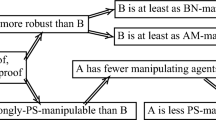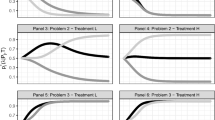Abstract
Many school districts in the US. employ centralized clearing houses to assign students to public schools. An important potential threat against any school choice mechanism is the tendency of schools to circumvent the procedure via two kinds of strategic manipulation: manipulation via capacities and manipulation via pre-arranged matches. This paper studies the extent of the vulnerability of three prominent school choice mechanisms that have been adopted (or, considered for adoption) by some school districts in the US. We find that the highly debated Boston mechanism as well as the top trading cycles mechanism are immune to manipulation via capacities, unlike the student-optimal stable mechanism (SOSM). We show that SOSM is immune to manipulation via capacities if and only if the priority structure satisfies an acyclicity condition proposed by Ergin (Econometrica 70:2489–2497, 2002). On the other hand, we show that essentially no mechanism is immune to manipulation via pre-arranged matches.
Similar content being viewed by others
References
Abdulkadiroğlu, A., Che, Y-K., Yasuda, Y.: Resolving conflicting preferences in school choice: the Boston mechanism reconsidered. Am Econ Rev forthcoming (2008)
Abdulkadiroğlu A., Pathak P., Roth A.: The New York City high school match. Am Econ Rev P&P 95(2), 364–367 (2005a)
Abdulkadiroğlu A., Pathak P., Roth A.: Strategyproofness versus efficiency in matching with indifferences: Redesigning the NYC high school match. Am Econ Rev 99, 1954–1978 (2009)
Abdulkadiroğlu A., Pathak P., Roth A., Sönmez T.: The Boston public school match. Am Econ Rev P&P 95(2), 368–371 (2005b)
Abdulkadiroğlu A., Sönmez T.: School choice: a mechanism design approach. Am Econ Rev 93, 729–747 (2003)
Balinski M., Sönmez T.: A tale of two mechanisms: student placement. J Econ Theory 84, 73–94 (1999)
Bogomolnaia A., Moulin H.: A simple random assignment problem with a unique solution. Econ Theory 19, 623–636 (2002)
Dubins L.E., Freedman D.A.: Machiavelli and the Gale-Shapley algorithm. Am Math Monthly 88, 485–494 (1981)
Ehlers L., Klaus B., Pápai S.: Strategy-proofness and population-monotonicity for house allocation problems. J Math Econ 83, 329–339 (2002)
Erdil A., Ergin H.: What’s the matter with tie-breaking? Improving efficiency in school choice. Am Econ Rev 98, 669–689 (2008)
Ergin H.: Efficient resource allocation on the basis of priorities. Econometrica 70, 2489–2497 (2002)
Ergin H., Sönmez T.: Games of school choice under the Boston mechanism. J Public Econ 90, 215–237 (2006)
Gale D., Shapley L.: College admissions and the stability of marriage. Am Math Monthly 69, 9–15 (1962)
Haeringer G., Klijn F.: Constrained school choice. J Econ Theory 144, 1921–1947 (2009)
Kesten O.: On two competing mechanisms for priority based allocation problems. J Econ Theory 127, 155–171 (2006)
Kesten O.: School choice with consent. Q J Econ 125(3), 1297–1348 (2010)
Kesten, O., Yazici, A.: The Pareto-dominant strategy-proof and fair rule for problems with indivisible goods. Econ Theory, forthcoming (2010)
Klaus B., Klijn F.: Procedurally fair and stable matching. Econ Theory 27, 431–447 (2006)
Kojima F.: Mixed strategies in games of capacity manipulation in hospital-intern markets. Soc Choice Welf 27, 25–28 (2006)
Kojima, F.: When can manipulations be avoided in two-sided matching markets? Maximal domain results. B.E. J Theor Econ (contribution), Article 32 (2007)
Kojima, F.: Robust stability in matching markets. Theor Econ, forthcoming (2010)
Kojima F., Pathak P.: Incentives and stability in large two-sided matching markets. Am Econ Rev 99, 608–627 (2008)
Konishi H., Unver U.: Games of capacity manipulation in hospital-intern markets. Soc Choice Welf 27, 3–24 (2006)
Ma J.: Strategy-Proofness and the strict core in a market with indivisibilities. Int J Game Theory 23, 75–83 (1994)
Ma J.: On randomized matching mechanisms. Econ Theory 8, 377–381 (1996)
McVitie D., Wilson B.: Stable marriage assignment for unequal sets. BIT 10, 295–309 (1970)
Pápai S.: Strategy-proof assignment by hierarchical exchange. Econometrica 68, 1403–1433 (2000)
Pathak P., Sönmez T.: Leveling the playing field: sincere and sophisticated players in the Boston mechanism. Am Econ Rev 98, 1636–1652 (2008)
Pathak, P., Sönmez, T.: Comparing mechanisms by their vulnerability to manipulation. Working paper, MIT and Boston College (2009)
Roth A.: The economics of matching: stability and incentives. Math Oper Res 7, 617–628 (1982)
Roth A.: The college admissions problem is not equivalent to the marriage problem. J Econ Theory 36, 277–288 (1985)
Roth A.: A natural experiment in the organization of entry-level labor markets: regional markets for new physicians and surgeons in the United Kingdom. Am Econ Rev 81, 415–440 (1991)
Roth A., Peranson E.: The effects of a change in the NRMP matching algorithm. Am Econ Rev 89, 748–780 (1999)
Roth A., Postlewaite A.: Weak versus strong domination in a market with indivisible goods. J Math Econ 4, 131–137 (1977)
Roth A, Rothblum U.G.: Truncation strategies in matching markets –In search of advice for participants. Econometrica 67, 21–43 (1999)
Roth A., Sotomayor M.: Two-Sided Matching. Cambridge University Press, New York (1990)
Roth A., Vande Vate J.H.: Incentives in two-sided matching with random stable mechanisms. Econ Theory 1, 31–44 (1991)
Shapley L.S., Scarf H.: On cores and indivisibility. J Math Econ 1, 23–28 (1974)
Sönmez T.: Manipulation via capacities in two-sided matching markets. J Econ Theory 77, 197–204 (1997)
Sönmez T.: Can pre-arranged matches be avoided in two-sided matching markets. J Econ Theory 86, 148–156 (1999)
Author information
Authors and Affiliations
Corresponding author
Additional information
I would like to thank William Thomson and Fuhito Kojima for useful discussions and suggestions.
Rights and permissions
About this article
Cite this article
Kesten, O. On two kinds of manipulation for school choice problems. Econ Theory 51, 677–693 (2012). https://doi.org/10.1007/s00199-011-0618-6
Received:
Accepted:
Published:
Issue Date:
DOI: https://doi.org/10.1007/s00199-011-0618-6




